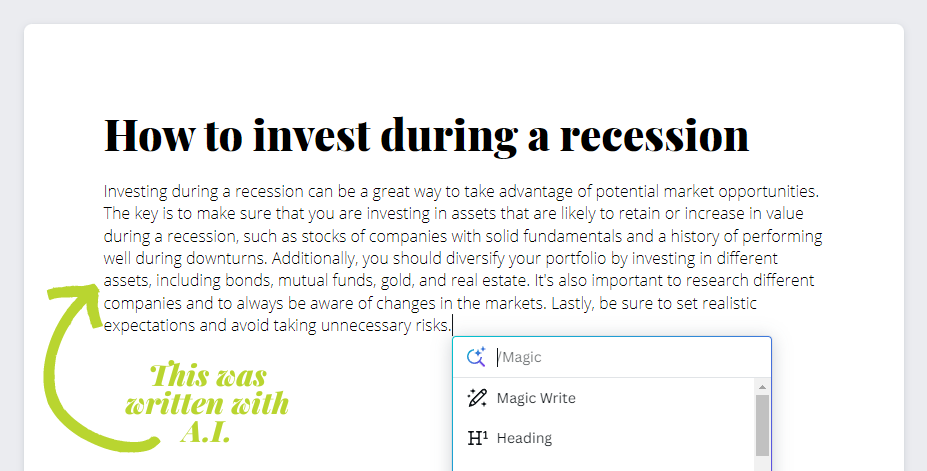Written by: Nate. W. Tonsager
Every year the World Economic Forum hosts a week-long conference where leaders from government, business, and civil society from across the globe gather in Davos Switzerland.
Their goal: to have meaningful discussions about not only economic challenges, but also social issues, and how their intersection can help solve problems. One of the major topics this year was Artificial Intelligence (AI) thanks to the rise in popularity of the online service, ChatGPT.
For anyone unfamiliar with ChatGPT, it’s provided by the company OpenAI and is designed to provide short, and long-form answers to any question you ask. And I mean any question. Recently, I’ve heard stories of people asking ChatGPT to write their term papers, college entrance essays or job cover letters, and some are finding success. Immediately, I want to call them cheaters, because they are, but that sparked a question for me: what’s the “right” way to use this technology?
AI is Best Used for Tasks with Black and White Inputs and Answers
Open AI recently received a $10 billion dollar investment from Microsoft, which was a real vote of confidence in their ideas from one of globe’s most respected technology firms. According to OpenAI’s website, their “mission is to ensure that artificial general intelligence – by which we mean highly autonomous systems that outperform humans at most economically valuable work – benefits all humanity.” Essentially, they believe that computer programs can more efficiently complete some work, and that efficiency boost will benefit all the world.
I think we all agree to that on some level. Technology is meant to make our lives easier and more immediate. For example, when’s the last time you used a map to navigate instead of your preferred GPS app? Or picked up a dictionary instead of using spell-check when typing? Technology and specifically artificial general intelligence seem better suited for tasks with black and white inputs and answers. For those types of questions, just listening to AI is sufficient. There’s no need to debate with a program about a known fact (i.e., 2+2=4). But the world is filled with gray, so how does AI handle those more complex, multi-layered questions? Spoiler alert… not great…

AI Lacks Something Important: Meaning
I’ve read a handful of ChatGPT’s responses to various questions, but obviously was most interested in how it handled questions related to wealth management. I was surprised at its level of coherent responses. As expected, it was great at reproducing and linking simple statements, but they all had the same fundamental problem in my opinion: zero substance. Said another way, their response had a lot of words that didn’t actual say anything meaningful. Sure, there were some small nuggets of information, but they ended up being common sense and didn’t provide any real value or solutions.
The more I read its response, the more it started to sound like a few advisors I’ve run into during my career; you know, the ones who take a generic approach and speak just like these programs. In my experience, those advisors are sales (not client) focused and seem determined to find ways to put less time and effort into each individual client and their portfolio. They seem to be working towards automating their clients’ plans and portfolios as if all problems will magically be solved by the wonders of technology. They claim it’s innovation, but I’d argue it’s closer to complacency. You can’t put a wealth plan on autopilot.
AI Enables Humans to Find Solutions – It is Not the Solution Itself
Technology isn’t meant to replace meaningful human work; it’s meant to enhance it. If you or your advisor blindly accepts whatever technology produces, you’re using technology wrong. Technology is a vital tool to help humans solve problems. But technology isn’t the solution by itself, especially for the complex problems related to your financial livelihood. Not only are the facts of your life unique, but so are the emotions you’re feeling. That quickly shifts financial planning topics into the “gray area” where AI struggles to provide the value that real humans with creativity and experience can.
We Need Creativity + Collaboration to Manage Wealth Effectively
Don’t settle for broad answers from a computer or a human advisor—especially if you’re paying to work with a Wealth Advisor. You need more meaningful insight and advice than a free online AI service can provide. Your Wealth Advisor should be working with you to find specific, actionable solutions tailored to your needs and goals for your specific financial situation.
This brings me to an outstanding point made by Will.i.am, musician and founder of the Black-Eyed Peas. Will.i.am has been a regular at Davos for years, and I think his interview on CNBC about ChatGPT and AI was spot on. To boil it down, he believes that creativity solves problems, and collaboration breeds creativity, so what you need is collaboration, not automation, to solve problems of all kinds. I believe that’s the “right” way to use AI. Not as a magic bullet, but as a tool to boost collaboration between man and machine to help enhance human creativity and make us better problem solvers. And I believe this approach to AI will not only benefit all of humanity but can better us as investors as well.
